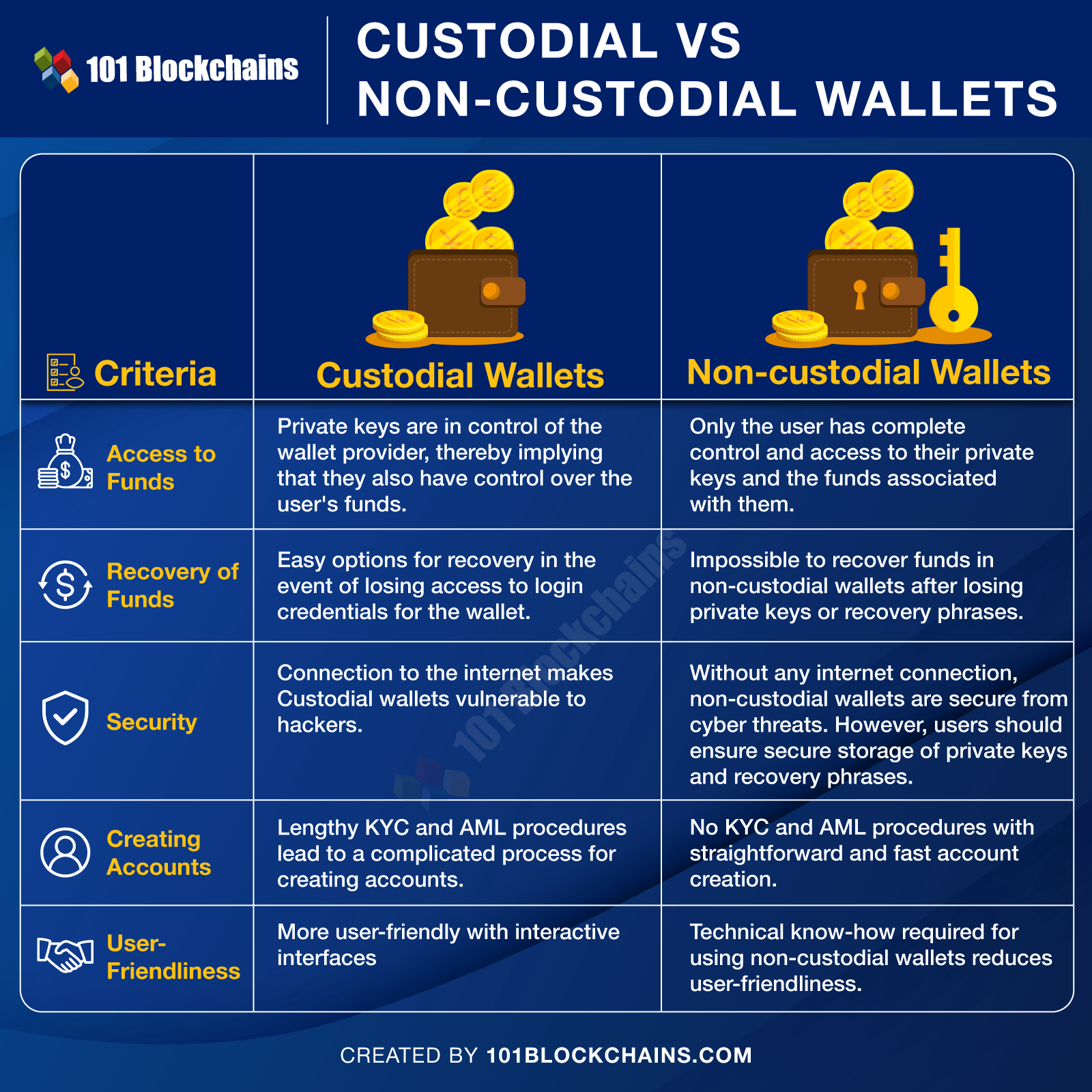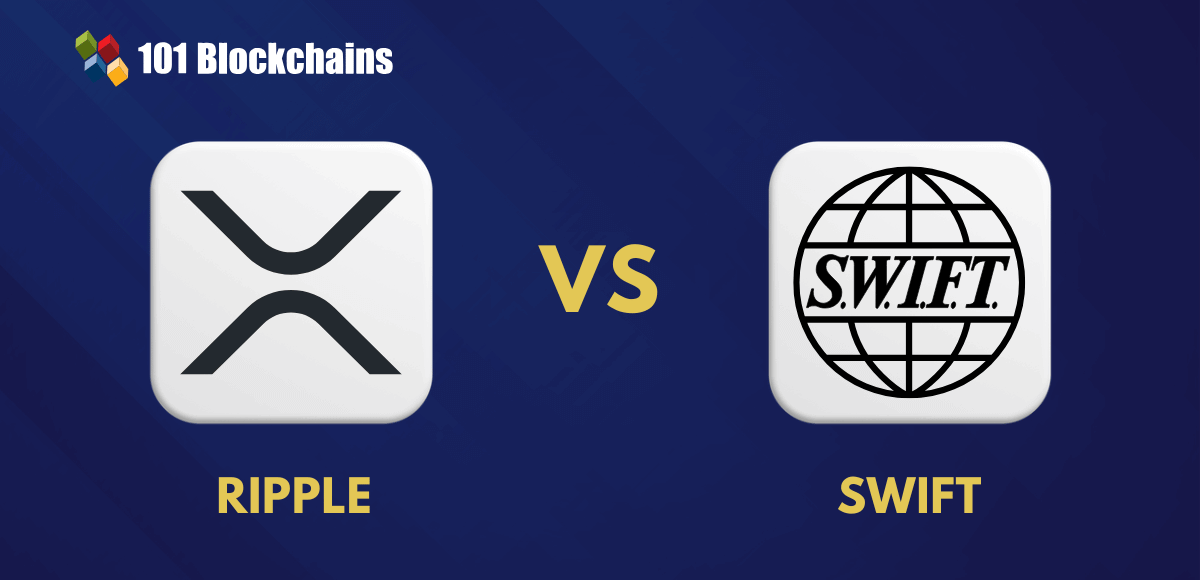Learn how blockchain truly works, master key definitions, and uncover what makes smart contracts so "smart." Dive into the fundamentals, gain valuable insights, and start your blockchain journey today!

- Comparisons
Georgia Weston
- on January 03, 2022
Custodial vs Non-Custodial Wallets – Key Differences
Familiar with the distinct categories of crypto wallets such as custodial and non-custodial wallets? Let’s move one step ahead and understand the differences between the two i.e. Custodial vs Non-custodial wallets.
Everywhere you look in the world of tech today, the term ‘crypto’ garners headlines in almost any discussion. Industry experts are hailing crypto as the next big thing in the domain of finance and technology in general. While cryptocurrency popularity continues to soar higher, people and institutions are eager to purchase cryptocurrencies. This is where you would come across the need for trustworthy solutions to store your cryptocurrencies.
Now, you would come across two distinct options, such as custodial and non-custodial wallets, in your search for a reliable crypto wallet. How are these wallets different from each other? Do they allow easy access to your cryptocurrencies and assets? Will they offer secure storage for your crypto? Let us find the answers to these questions in detailed comparison between the custodial and non-custodial variants of crypto wallets in the following discussion.
Want to become a Cryptocurrency expert? Enroll Now in Cryptocurrency Fundamentals Course
What are Crypto Wallets?
The urge to participate in the newly emerging crypto landscape is undeniable in any circumstance. You can obtain cryptocurrency through different methods, such as purchasing crypto by using an exchange. People could also get cryptocurrency as payment for their job or as rewards for mining, staking, or other tasks.
For example, you can purchase Bitcoin through a centralized exchange such as Binance. However, the source of obtaining a crypto asset does not matter as long as you have a wallet for storing your crypto assets safely. The wallet generates a unique address, which serves as an identifier for locating your assets on the blockchain.
Another important aspect of crypto wallets refers to the use of two different types of keys, such as public keys and private keys. You can share the public key with anyone, while the private key is more like a password for securely locking your assets. You must safeguard your private key at all costs as it opens access to all your crypto assets and tokens.
Based on the type of security for your funds, you can find two distinct categories of wallets such as custodial and non-custodial wallets. It is important to reflect comprehensively on the differences between them for identifying the better choice for your crypto pursuits. A detailed overview of each type of wallet followed by a custodial vs non-custodial wallets comparison on the grounds of specific factors can help in choosing the right pick.
Want to understand the technological foundation of the first Blockchain, i.e., Bitcoin? Enroll Now: Getting Started with Bitcoin Technology
-
Custodial Wallets
The first entry among discussions on difference between custodial and non-custodial wallets would obviously bring the limelight on custodial wallets. One can clearly infer from the term ‘custodial’ that these wallets would take custody of something. As a matter of fact, custodial wallets are the crypto wallets that take custody of the private keys of users. Therefore, the wallet providers have control over the funds of the user on behalf of the latter. The most popular wallets preferred by newcomers, such as Coinbase, are custodial wallets.
Custodial wallets present one of the most crucial advantages for beginners, i.e., ease of use. You don’t need advanced technical know-how about cryptocurrencies for using custodial wallets. Just create an account with your email and password, and then login into the custodial wallet. However, you have to put the custody of your funds with the wallet provider in the case of custodial wallets.
It is important to note that the point of cryptocurrency is all about gaining complete control and ownership of your money. On the contrary, custodial crypto wallets take away the fundamental meaning of cryptocurrency. You would not feel like investing in a decentralized digital currency with custodial wallets.
With your cryptocurrency in a custodial wallet, you are basically handing over the security of your funds to another individual. Now, you cannot expect renowned custodial wallet providers to steal the funds of users. However, you may not access your cryptocurrency once the wallet provider locks you out of the wallet without notice. Coinbase users have faced such issues various times, thereby creating doubts about credibility of custodial wallets.
-
Non-custodial Wallets
The setbacks in custodial wallets serve as fuel for debates on custodial vs non-custodial wallets. Non-custodial wallets are not just an alternative to custodial wallets but also a gleaming example of introducing complete decentralization. A non-custodial wallet generally referred to as a decentralized wallet, is basically a crypto wallet that entrusts users with the control of their private keys. Only the user could access the crypto held in non-custodial wallets, thereby presenting favorable value for users in terms of ownership. Furthermore, non-custodial wallets also offer the assurance for improved security of your cryptocurrency.
On the other hand, the advantages of non-custodial crypto wallets come with a critical condition. Users should have a basic know-how of backing up and restoring wallets. In addition, non-custodial wallets also require users to take responsibility for security of their cryptocurrency. The wallet user has to be accountable for the security of their private keys, thereby implying the need for knowledge on secure backup of a wallet.
In most cases, the private key is generally a 12 to 24-word recovery phrase. Users have to store the recovery phrase in a secure location. For example, you can note down the recovery phrase on a piece of paper and place it in a safe. Users can also type the recovery phrase on a document on their computer and store the hard drive safely in a secure location.
The recovery phrase is an important highlight for all crypto wallets as it helps in regaining access to the wallet. However, any individual with the recovery phrase could access the non-custodial wallet. So, the user should refrain from storing their recovery phrase online or sharing it with other people.
Custodial vs Non-custodial Wallets: Understand the Differences

Please include attribution to 101blockchains.com with this graphic. <a href='https://101blockchains.com/blockchain-infographics/'> <img src='https://101blockchains.com/wp-content/uploads/2022/01/Custodial-vs-Non-custodial-Wallets.png' alt='Custodial vs Non-custodial-Wallets='0' /> </a>
After a thorough overview of custodial and non-custodial wallets, you must be eager to identify the differences between them. You can differentiate the two popular variants of wallets for storing your crypto by taking many factors into consideration. Here are some of the prominent differences you can note in any comparison between non-custodial and custodial wallets.
-
Access to Funds
The foremost factor involved in a custodial vs non-custodial wallets comparison focuses on accessibility of funds. In the case of non-custodial wallets, you can get complete access to the crypto assets in your wallet. On the other hand, custodial wallets also imply that the wallet provider could also access your private keys. Therefore, custodial wallets take custody of your funds associated with the private keys as well.
Custodial wallets do not come out nicely in the difference between custodial and non-custodial wallets in terms of access to funds. Crypto owners would definitely perceive some risks in trusting third-party applications with their valuable crypto assets. However, popular custodial wallets such as Binance and Coinbase have successfully earned the trust of crypto users. If you don’t want to take the trouble of safeguarding your private keys from unauthorized access, custodial wallets might be the right pick for you. On the contrary, experienced traders with technical know-how of backing up and restoring their wallets could choose non-custodial wallets.
-
Recovery of Funds
While access to funds is definitely an important point of comparison between custodial and non-custodial wallets, it is also important to reflect on the possibilities for recovery of funds. Majority of crypto exchanges have custodial wallets connected directly to the user accounts on the platform. If users forget their login credentials, then they can rely on the wallet provider for recovering their credentials. All you have to do is enter the additional information provided at the time of creating the account.
Custodial wallets make recovery of funds so easy that you might not want to look at non-custodial wallets. In the case of non-custodial crypto wallets, you have to take the responsibility of safeguarding your recovery phrase and private keys. If a user loses their private keys and the seed phrase, then they could not recover access to their account. The private keys are the only way to access or recover your funds from non-custodial wallets, and losing the keys means losing your funds permanently.
Also Check: The Ultimate Guide On How To Invest In Cryptocurrencies?
-
Security
The most critical factor in a custodial vs non-custodial wallets comparison would draw your attention towards security. Any crypto owner would be worried about the security of their assets when they store them on a specific platform. Many custodial wallets you can find presently in the market are completely secure and safe for storage of crypto assets.
In addition, popular custodial wallets implement unique authentication mechanisms to ensure safeguards against unauthorized access. At the same time, it is important to note that custodial wallets need an internet connection. Therefore, custodial wallets are highly vulnerable to attacks by hackers. For example, popular custodial wallets such as Mt. Box and Cryptopia were compromised by hackers, resulting in theft of millions of dollars. On top of it, users have not recovered anything from the attack, thereby creating questions on the efficacy of custodial wallets.
The other player in the difference between custodial and non-custodial wallets has a clear advantage over custodial wallets. The first thing you need to note about non-custodial wallets for security is the control over your private keys. Only the user can access their private keys in non-custodial wallets.
Therefore, non-custodial wallets offer a considerably secure approach for safeguarding your funds from unauthorized access. On the other hand, non-custodial wallets also have a slight chink in their armor when it comes to security. Non-custodial wallet users have to store their recovery phrases and private keys securely to avoid unauthorized access to their funds.
Aspiring to become a Blockchain Security expert? Enroll Now: Certified Blockchain Security Expert (CBSE)
-
Creating Accounts
Another important highlight in comparisons between custodial and non-custodial wallets would refer to the ease of creating accounts. In the case of custodial wallets, you must go through different KYC and AML procedures for creating an account or using the wallet. The complexity of the KYC and AML procedures varies considerably for different service providers. While these procedures are essential for security, certain custodial wallets could take a considerably longer time for completing KYC verification.
Non-custodial wallets are one step ahead in the custodial vs non-custodial wallets comparison for ease of creating accounts. They do not require any KYC or AML procedures and also keep the identity of users anonymous. With a fast and easy process for creating your accounts, non-custodial wallets definitely offer better ease of use.
-
User Friendliness
The difference between custodial and non-custodial wallets in terms of user-friendliness tilts in favor of custodial wallets. Beginners, as well as experienced traders, use popular custodial wallets such as Binance, Coinbase, and others. Web-based custodial wallets are the most preferred choice, especially for their user-friendly interfaces. Furthermore, custodial wallets also allow users to trade seamlessly on different popular exchanges without any setbacks.
In the case of non-custodial wallets, users have to move their assets manually between different exchanges. In addition, some non-custodial wallets do not offer the facility for access to an internet connection. Therefore, you might have to go through complicated steps for carrying out transactions with non-custodial wallets.
Learn non-stop with 101 Blockchains free blockchain resources and take your blockchain expertise to the next level.
Bottom Line
The final verdict on the choice between custodial and non-custodial wallets depends largely on what you want. Your requirements and plans for your crypto pursuits would play a crucial role in defining the choice of crypto wallet. For example, if you are a beginner in crypto, you can go with custodial wallets for crypto trading.
On the other hand, if you want to store a hefty sum of cryptocurrency securely, non-custodial wallets will be the right pick. Each type of crypto wallet has its own advantages and setbacks, and the comparison between them presents clarity for making decisions. Learn more about both types of wallets and find the best option for you right now.
*Disclaimer: The article should not be taken as, and is not intended to provide any investment advice. Claims made in this article do not constitute investment advice and should not be taken as such. 101 Blockchains shall not be responsible for any loss sustained by any person who relies on this article. Do your own research!





